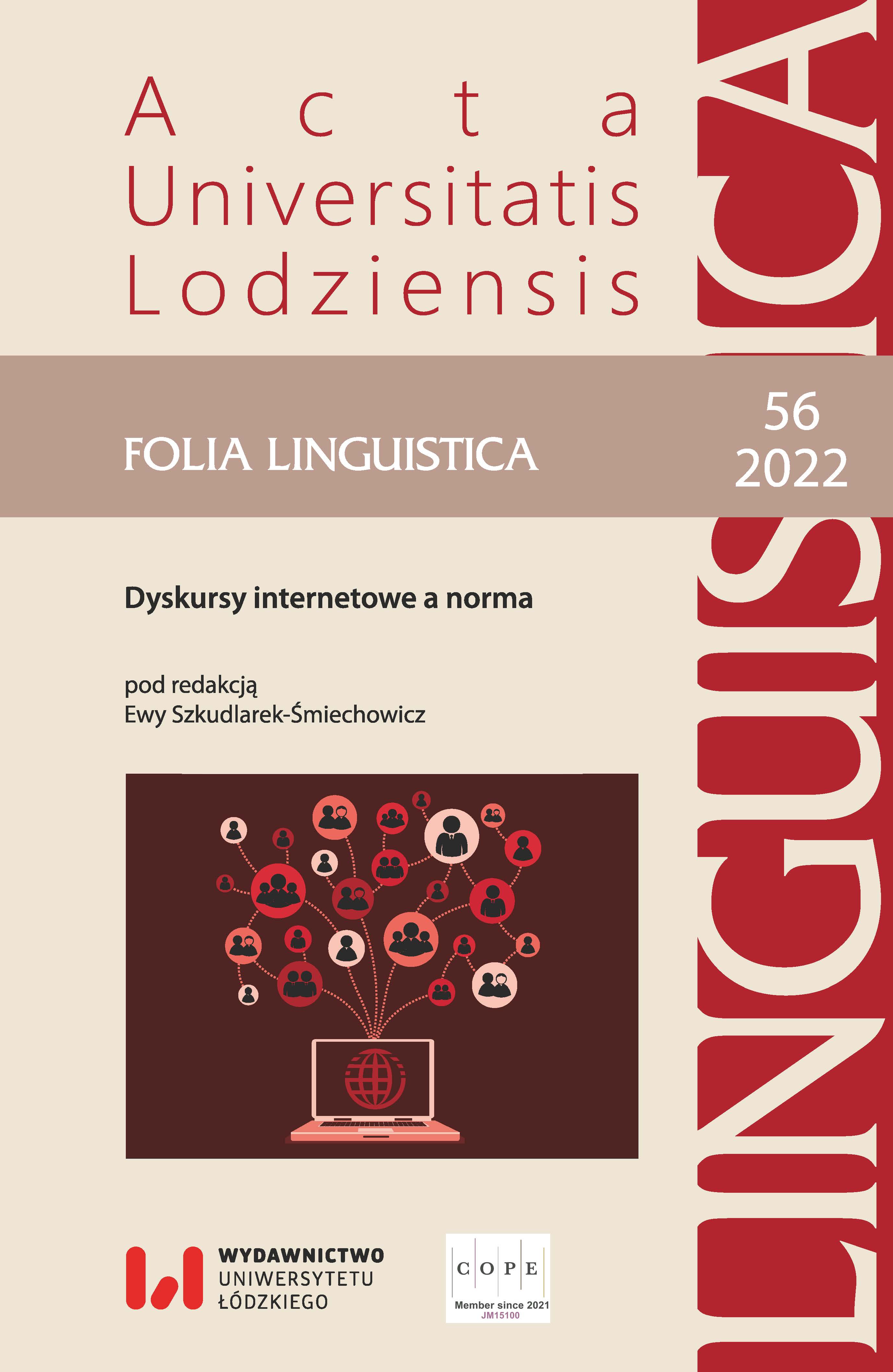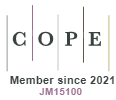Funkcja glosariuszy w tekstach literatury spekulatywnej
DOI:
https://doi.org/10.18778/0208-6077.56.24Słowa kluczowe:
genologia, glosariusz, literatura spekulatywnaAbstrakt
Rozważania w niniejszym artykule dotyczą roli glosariuszy w tekstach literatury spekulatywnej. Definiuje się ją jako superkategorię obejmującą wszystkie teksty, które nie opisują rzeczywistości i typologizowane są w obrębie takich konwencji literackich, jak: fantasy, science fiction, horror. Perspektywą dla analiz jest teza, że we współczesnej praktyce komunikacyjnej wyraźnie wyodrębnia się kilka odmiennych sposobów rozumienia pojęcia glosariusz niż w tradycyjnym ujęciu, co ma swoje odzwierciedlenie w tekstach literatury spekulatywnej. Glosariusze przyjmują tutaj postać wariantu wzorca gatunkowego, stąd do analiz wykorzystuje się narzędzia genologii lingwistycznej. Badane glosariusze najbliższe wzorcowi są w aspekcie strukturalnym. W wymiarze makrostruktury stanowią wykaz haseł ułożonych alfabetycznie i umieszczonych na końcu książki lub w osobnym woluminie, w wymiarze mikrostruktury zawierają różne objętościowo i graficznie wyróżnione artykuły hasłowe. Ich odmienność sytuuje się na poziomie pragmatycznym i poznawczym, co jest uwarunkowane tym, że umieszczone na peryferiach tekstu, zajmują uprzywilejowany obszar pragmatycznego wymiaru dzieła, czyli jego oddziaływania na czytelnika. Pełnią one zarówno typową dla tego gatunku mowy funkcję preskryptywną, jak i wynikającą ze współczesnej praktyki komunikacyjnej funkcję deskryptywną. Glosariusze w tekstach literatury spekulatywnej wobec tekstu głównego odgrywają różnorodne role: od słowniczka definiującego wprowadzane nominacje bohaterów, nazwy toponimiczne, terminy itp., po różnorodne komentarze wyjaśniające na przykład niuanse fabuły, perspektywę kulturową czy mitologiczną przedstawianych treści. Często stanowią w pewnym sensie drugą narrację obok tej zasadniczej w tekście głównym.
Pobrania
Bibliografia
Edelman D.L., 2006, Infoqake, New York.
Google Scholar
Edelman D.L., 2010, Geosynchron, New York.
Google Scholar
Herbert F., 1965, Dune, Southampton.
Google Scholar
Pratchett T., 2015, The Compleat Discworld Atlas: Of General & Descriptive Geography Which Together With New Maps and Gazetteer Forms a Compleat Guide to Our World & All It Encompasses, London.
Google Scholar
Tolkien J.R.R., 1999, Silmarillion, London.
Google Scholar
Genette G., 1992, Palimpsesty. Literatura drugiego stopnia, translated by A. Milecki, in: H. Markiewicz (ed.), Współczesna teoria badań literackich za granicą. Antologia, vol. 4, part 2, Kraków: Wydawnictwo Literackie, pp. 316–366.
Google Scholar
Landon B., 2014, Extrapolation and Speculation, in: R. Latham (ed.), Oxford Handbook of Science Fiction, Oxford: Oxford University Press, pp. 25–36.
Google Scholar
Oziewicz M., 2013, Children’s Literature, Film, TV, and Media, Minneapolis, http://oxfordre.com/literature/view/10.1093/acrefore/9780190201098.001.0001/acrefore-9780190201098-e-78 (access: 10.03.2021).
Google Scholar
Oziewicz M., 2017, Speculative Fiction, http://oxfordre.com/literature/view/10.1093/acrefore/9780190201098.001.0001/acrefore-9780190201098-e-78 (access: 1.03.2021). https://doi.org/10.1093/acrefre/9780190201098.013.78
Google Scholar
Matthews G.R., 2015, A Slip of the Keyboard by Terry Pratchett, https://www.grmatthews.com/post/2015/06/25/a-slip-of-the-keyboard-by-terry-pratchett (access: 1.03.2021).
Google Scholar
Piętkowa R., 2004, Paratekst o autorze. Biogram i/czy prezentacja?, in: D. Ostaszewska (ed.), Gatunki mowy i ich ewolucja, vol. II: Tekst a gatunek, Katowice: Wydawnictwo Uniwersytetu Śląskiego, pp. 230–245.
Google Scholar
Ratajczyk S.M.A., 2007–2008, Sacrum w twórczości Johna Ronalda Reuela Tolkiena, “Studia Warmińskie” 44–45, pp. 113–131.
Google Scholar
Trocha B., 2009, Degradacja mitu w literaturze fantasy, Zielona Góra: Oficyna Wydawnicza Uniwersytetu Zielonogórskiego.
Google Scholar
Uździcka M., 2017, O nowym pojęciu glosariusza. Rekonesans badawczy, ”Stylistyka” 26, pp. 269–289. https://doi.org/10.25167/Stylistyka26.2017.17
Google Scholar
DOI: https://doi.org/10.25167/Stylistyka26.2017.17
Uździcka M., 2020, Paratekst w literaturze fantasy (na podstawie glosariusza), ”Literatura i Kultura Popularna” 26, pp. 151–168. https://doi.org/10.19195/0867-7441.26.12
Google Scholar
DOI: https://doi.org/10.19195/0867-7441.26.12
Witosz B., 2005, Genologia lingwistyczna. Zarys problematyki, Katowice: Wydawnictwo Uniwersytetu Śląskiego.
Google Scholar
Wojtak M., 2004a, Wzorce gatunkowe wypowiedzi a realizacje tekstowe, in: D. Ostaszewska (ed.), Gatunki mowy i ich ewolucja, vol. II: Gatunek a tekst, Katowice: Wydawnictwo Uniwersytetu Śląskiego, pp. 29–39.
Google Scholar
Wojtak M., 2004b, Gatunki prasowe, Lublin: Wydawnictwo Uniwersytetu Marii Curie-Skłodowskiej, pp. 16–17.
Google Scholar
Pobrania
Opublikowane
Jak cytować
Numer
Dział
Licencja

Utwór dostępny jest na licencji Creative Commons Uznanie autorstwa – Użycie niekomercyjne – Bez utworów zależnych 4.0 Międzynarodowe.










